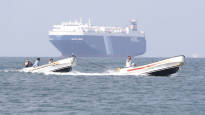The voyage of the Bahamian-flagged cargo ship Unity Explorer in the Red Sea did not go as planned.
The ship is expected to dock in Singapore in the middle of this month. At the beginning of this month, Houthi rebels operating in Yemen and supported by Iran attacked a ship in the Red Sea with drones. The Unity Explorer survived the incident with minimal damage.
The Houthis, operating in the northern part of Yemen, used an armed drone and at least one anti-ship missile in the attacks. According to the Houthi representative, the ship did not obey the warnings of the group’s navy.
The Iranian-backed armed group has been harassing merchant ships in many ways. Ships have been forced into Yemeni ports. For example, the Galaxy Leader cargo ship was diverted to Al-Salif at the beginning of December.
An Israeli billionaire Idan Oferin a ship belonging to the company was hit by a missile in November on the Indian Ocean side. According to news agency AP, Iranian armed groups are suspected of the attack.
Tension has increased in the Red Sea since the extremist organization Hamas attacked Israel in early October and Israel began countermeasures in Gaza.
The tightening of the atmosphere is illustrated by the fact that the American Arleigh Burke-class missile destroyer USS Carney, patrolling the Red Sea, has shot down drones in the sea area. It tells about it, among other things The New York Times magazinei.
The attacks will stop if Gaza gets help
The Houthis say they will attack ships bound for and bound for Israel if food and medicine are not delivered to Gaza. Israel is According to The Washington Post requested support from the United States. President Joe Biden has already discussed the protection of merchant vessels.
The British company Ambrey specializes in international maritime security services. The company’s principal analyst for the Middle East and Indian Ocean David Mueller says that the Red Sea region is now exceptionally risky, especially due to the activity of the Houthi rebels.
– Gaza is almost two thousand kilometers away, but there are targets even closer, ships connected to Israel, says David Mueller in a telephone interview from London.
Jamming ships is relatively easy in the Red Sea, as the sea is heavily trafficked and geographically relatively small, just under 400 kilometers at its widest. Large ports from Egypt to Saudi Arabia are located in the area.
Israel-bound ships under threat
Chief analyst David Mueller says that the increased threat so far primarily concerns ships connected to Israel.
– The most visible sign of the connection is of course the flag, but the threat concerns shipping companies, owners and ports connected to Israel. The connection may even be out of date.
Yemen’s Houthi rebels seem to be capable not only of attacks carried out in the group’s nearby waters, but also of attacks that reach farther. In October, the group fired one ballistic missile towards Eilat, 1,600 kilometers away. Israel’s air defense said it destroyed the missile in space.
– Today, the Houthis use Saudi Arabia’s airspace less. Missiles are fired over the Red Sea. If the missiles are countered or damaged over the sea, collateral damage can occur.
According to Mueller, some shipping companies have started rerouting ships because of the recent incidents.
– In at least one case, the ship has gone around Africa via Cape Horn to avoid the Suez Canal and the Red Sea.
The pacification of Gaza would silence the Houthi offensive
The war in Gaza will be reflected in the sea as long as the clashes continue, Mueller estimates.
– If an agreement with a ceasefire in Gaza is reached, the threat caused by the Houthis will recede. The security of the Red Sea is also more broadly related to the future of Gaza.
According to Mueller, the reactions of other armed groups, such as the Hezbollah network and actors in Iran, Iraq and Syria, to Gaza will affect the activities of the Houthis in the Red Sea. If Hamas is destroyed, the cycle of revenge will deepen.
The Ambrey company sells security services from armed guards to submarines and from digital surveillance to risk analysis. In addition to wars and conflicts, maritime risks are increased by drugs or weapons. Organized crime groups argue over illegal cargo.
The means of security companies are limited in areas of serious risk.
– It is difficult to act against states or organized groups like the Houthis. Armed guards can be added to the ships, but protecting against drones, for example, is challenging.
Mines are drifting in the Black Sea
Another maritime risk area is the Black Sea. Chief analyst David Mueller says that the risks in the Black Sea are wider than those in the Red Sea.
– A ship can be hit by a missile, even if it is not the target of the attack. Mines have not been placed on shipping lanes, but they can drift in the sea, says Mueller.
In the Black Sea, cargo ships are quite vulnerable. The bottom structures of ships can be strengthened to combat mine damage. Unusual objects may be detected with enhanced vision.
Although traffic to Odessa and other Ukrainian ports has slowed down, it has not stopped. The international Marinetraffic website saysthat today, Monday, there were 23 in the port of Odessa and four ships were arriving there.
AP, Reuters
